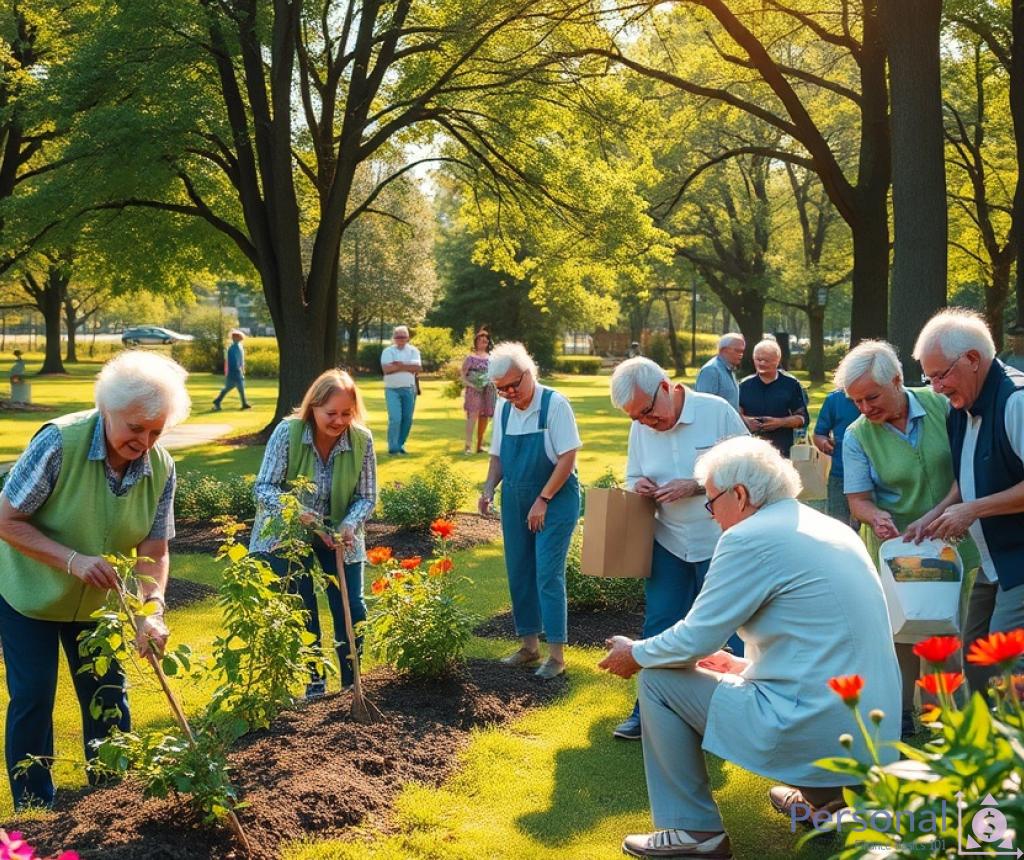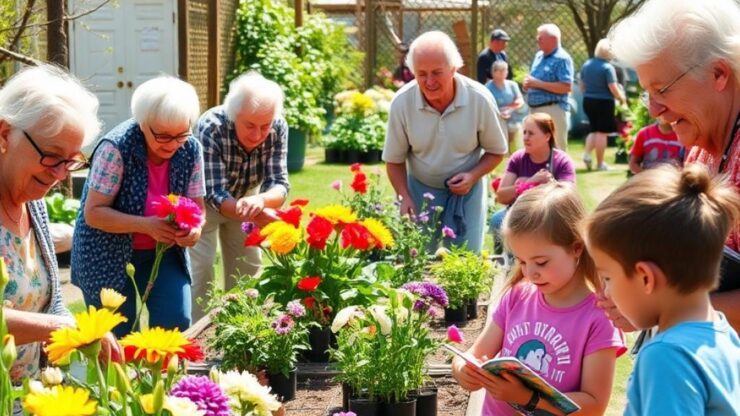Enhancing Well-Being Through Volunteering

As individuals transition into retirement, many seek meaningful activities that not only occupy their time but also enrich their lives. Volunteering presents a unique opportunity to enhance well-being by fostering social connections, promoting physical health, and instilling a sense of purpose. Engaging in volunteer work can lead to profound personal growth and satisfaction, making it a vital consideration for retirees looking to enhance their quality of life.
Research indicates that volunteering can significantly improve both mental and physical health. The act of helping others fosters a sense of belonging and reduces feelings of isolation, which is particularly beneficial for retirees who may find themselves distanced from their previous social circles. Moreover, volunteering often involves physical activity, which contributes to better health outcomes. Below is a summary of the key health benefits associated with volunteering:
- Improved Mental Health: Engaging in volunteer activities can reduce symptoms of depression and anxiety.
- Increased Physical Activity: Many volunteer roles require physical effort, which can enhance overall fitness.
- Enhanced Social Connections: Volunteering allows retirees to meet new people and develop friendships.
- Boosted Self-Esteem: Helping others fosters a sense of accomplishment and purpose.
The array of volunteer opportunities available to retirees is vast and varied, catering to diverse interests and skills. From mentoring youth to aiding local non-profits, the options are plentiful. Below are some popular avenues for retirees to explore:
- Community Service Organizations
- Educational Programs and Tutoring
- Health and Wellness Initiatives
- Environmental Conservation Projects
- Arts and Cultural Programs
By selecting a volunteer opportunity that aligns with personal interests and values, retirees can maximize the benefits of their contributions while enjoying the process of giving back.
Exploring Diverse Volunteer Opportunities for Seniors
As retirees embark on a new chapter of their lives, the quest for fulfilling engagements becomes paramount. Volunteering serves as a gateway to a plethora of rewarding experiences that not only contribute to the community but also nurture personal growth. The richness of volunteering opportunities allows seniors to leverage their skills and passions while making a difference in the lives of others. Engaging in such meaningful activities can transform the retirement experience into one filled with purpose and joy.
Community Service Organizations stand as a cornerstone for many retirees seeking to give back. These organizations often require diverse skills, from administrative support to hands-on assistance. By volunteering at local shelters or food banks, seniors can directly see the impact of their contributions. Participating in community service not only aids those in need but also fosters a sense of belonging among volunteers, creating a supportive network that can alleviate feelings of isolation.
Similarly, educational programs and tutoring provide an avenue for retirees to share their wealth of knowledge and experience. Whether it’s tutoring children in reading or mentoring young adults in career preparation, the role of an educator can be incredibly gratifying. This not only enriches the lives of the learners but also allows retirees to remain intellectually engaged, keeping their minds sharp and active.
In addition to these options, health and wellness initiatives present unique volunteering opportunities that focus on promoting healthier lifestyles within the community. Seniors with a background in health care or fitness can lead exercise classes or health workshops, bringing their expertise to those who might benefit from it. This not only empowers others to improve their health but also provides the volunteers with a sense of accomplishment and vitality.
Moreover, retirees can delve into environmental conservation projects, where their efforts contribute to preserving the planet. Whether it’s participating in clean-up campaigns or planting trees, these initiatives foster a connection with nature and instill a sense of legacy, knowing that their actions are helping future generations. Engaging in such activities often ignites a passion for environmental stewardship, which can be highly rewarding.
Finally, the arts and cultural programs offer a vibrant outlet for creativity. Seniors can participate in or lead workshops in painting, music, or theater, allowing them to express themselves and share their talents. This not only enriches the cultural fabric of the community but also promotes mental well-being, as engaging in artistic endeavors has been linked to reduced stress levels and enhanced emotional health.
With such a diverse range of volunteering opportunities available, retirees are encouraged to explore avenues that resonate with their interests and skills. Not only does volunteering enrich the lives of those being served, but it also provides seniors with a renewed sense of purpose and fulfillment in their golden years.
Building Community Connections in Retirement
As retirees navigate this new phase of life, the opportunity to forge meaningful connections within their communities becomes increasingly important. Volunteering serves as a powerful conduit for building these connections, allowing individuals to interact with diverse groups of people while contributing to shared causes. This not only cultivates a sense of belonging but also reinforces the fabric of the community itself. Engaging in community service can transform isolation into camaraderie, thereby enriching the lives of retirees and those around them.
At the heart of community volunteering lies the concept of shared goals. When retirees engage in activities aimed at helping others, they often find themselves working alongside fellow volunteers who share similar interests and values. This shared purpose creates a unique bond, facilitating friendships that might not have formed otherwise. For instance, a retiree who assists in organizing local events can connect with others who are passionate about community enrichment. These relationships can evolve into lasting friendships, providing emotional support and camaraderie during a time when social networks may have diminished.
Volunteering does not just benefit the individuals involved; it creates a ripple effect throughout the community. As retirees dedicate their time and efforts to various initiatives, they inspire others to get involved as well. This can lead to a surge in community participation, where residents feel a collective responsibility towards one another. Furthermore, as volunteers engage with local organizations, they help raise awareness about important issues, fostering a culture of empathy and support. Such efforts can significantly enhance community resilience, as individuals come together to address shared challenges, whether they be social, economic, or environmental.
Additionally, the sense of community connection cultivated through volunteering often extends beyond the immediate circle of volunteers. Family members of retirees and the individuals served by these initiatives witness the positive changes that come from active participation. This can inspire younger generations to emulate these values, creating a legacy of service and community engagement that can last for years to come. In this way, retirees not only enrich their own lives but also contribute to a broader cultural shift that values connection and support.
Developing New Skills and Interests Post-Retirement
Retirement is often viewed as a time for rest and relaxation, yet it can also serve as an opportune moment for personal development. Many retirees discover that volunteering not only fills their time but also provides a platform for learning new skills and exploring untapped interests. This transformative phase can lead to unexpected passions and capabilities, enriching both their lives and the lives of those they serve.
Participating in volunteer activities offers retirees a chance to engage in diverse roles that challenge them and promote growth. For example, those who have never considered themselves artists might find themselves involved in community art projects, tapping into a creative side they never knew existed. Similarly, retirees with a knack for technology can volunteer with local organizations to help others navigate the digital world. Such experiences not only bolster self-confidence but also enable retirees to acquire valuable skills that can enhance their personal and professional lives.
In an era where continuous learning is paramount, volunteering serves as an ideal avenue for retirees to remain intellectually engaged. Many volunteer positions require skill sets that can be developed and honed over time. For instance, a retiree who assists in organizing community events may discover a passion for project management, leading them to pursue further training or certification in this field. This adaptability fosters a mindset of lifelong learning, encouraging retirees to remain curious and open to new experiences. Moreover, volunteering can also provide networking opportunities, connecting retirees with professionals and mentors who share similar interests, thereby enriching their social lives.
Ultimately, the quest for new skills and interests post-retirement is a journey best navigated through the lens of volunteering. By engaging in community service, retirees can cultivate a rich tapestry of experiences that not only contribute to their personal growth but also invigorate their sense of purpose. As they embrace these opportunities, they not only enhance their own lives but also make a lasting impact in the communities they serve.
The Impact of Volunteering on Mental Health
Engaging in volunteer work is not merely an act of kindness; it is a powerful catalyst for enhancing mental health among retirees. The act of helping others creates a sense of fulfillment that resonates deeply within the human psyche. As retirees immerse themselves in altruistic endeavors, they often experience a significant uplift in mood and a reduction in feelings of loneliness. This psychological transformation stems from the inherent satisfaction that arises when one recognizes their ability to effect positive change in the lives of others.
Research has consistently demonstrated that volunteering serves as an effective buffer against depression, particularly in older adults. When retirees dedicate their time to meaningful causes, they foster a renewed sense of purpose that can be life-altering. Through the formation of social bonds with fellow volunteers and the communities they serve, retirees often find themselves part of a supportive network that combats social isolation. This connection not only diminishes feelings of sadness but also enhances overall emotional stability. The shared experience of working towards common goals amplifies feelings of belonging, creating an environment where mental wellness can flourish.
Volunteering in retirement is intrinsically linked to improved self-esteem and confidence. As retirees take on new roles and responsibilities, they discover latent abilities and talents that they may have previously overlooked. This journey of self-discovery is not only empowering but also reinforces a positive self-image. The recognition received from peers and community members for their contributions further solidifies this sense of worth. The emotional benefits are profound; retirees often report a heightened sense of happiness and contentment, which can mitigate feelings of anxiety and promote resilience in the face of life’s challenges.
Disclaimer
This article has been created or edited with the support of artificial intelligence and is for informational purposes only. The information provided should not be considered investment advice. Please seek the support of a professional advisor before making any investment decisions.






